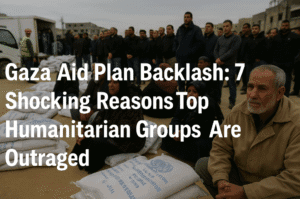Gaza Aid Plan Backlash: 7 Shocking Reasons Top Humanitarian Groups Are Outraged
A controversial U.S.-Israel aid plan for Gaza has drawn sharp criticism from humanitarian groups, who argue it compromises core principles like neutrality and independence. The plan, driven by the Trump administration, proposes distributing food through four sites in southern Gaza controlled by Israeli forces, aiming to bypass Hamas. While Israel cites security concerns, aid organizations warn this setup weaponizes relief and forces civilian displacement, aligning aid delivery with military objectives.
Critics also stress logistical concerns, as the plan reduces 400 UN-run distribution points to just four, limiting access for vulnerable populations. Echoes of past U.S. interventions—like in Iraq—highlight the ethical dangers of militarized aid. Key uncertainties, such as funding sources and oversight, further undermine trust in the plan. Aid experts caution that politicizing humanitarian efforts can deepen suffering and erode public trust. Ultimately, the Gaza crisis exposes a global dilemma: whether humanitarian action can remain impartial in politically charged conflict zones.

Gaza Aid Plan Backlash: 7 Shocking Reasons Top Humanitarian Groups Are Outraged
A controversial U.S.-backed proposal to address Gaza’s hunger crisis has sparked fierce opposition from leading aid organizations, exposing tensions between geopolitical strategies and the core tenets of humanitarian work. The plan, negotiated amid pressure from the Trump administration, aims to restart food deliveries after a 10-week Israeli blockade but has drawn criticism for its operational framework and ethical implications.
The Plan’s Framework: Security Over Neutrality?
Under the proposed initiative, a newly formed Swiss charity, the Gaza Humanitarian Foundation, would establish four distribution sites in southern Gaza, cordoned off by Israeli forces to block Hamas access. The program would initially serve 1.2 million Palestinians—roughly 60% of Gaza’s population—with prepackaged food and supplies. Israeli officials argue this approach prevents aid diversion by Hamas, a claim the UN disputes, citing robust monitoring mechanisms in existing distribution channels.
U.S. Ambassador Mike Huckabee emphasized urgency, stating, “President Trump has tasked his team to accelerate humanitarian aid into Gaza.” Meanwhile, Israel’s Foreign Minister Gideon Saar framed the plan as a security necessity: “Hamas must not be allowed to get their hands on [aid].”
Aid Groups Push Back: Violations of Core Principles
Major humanitarian organizations, including UN agencies, have rejected the proposal, calling it a departure from the principles of humanity, impartiality, independence, and neutrality. They argue that conditioning aid on displacement—requiring civilians to move south—effectively endorses Israel’s military strategy, which includes eventual population relocation.
“We will not participate in any scheme that uses aid as a pressure tactic,” stated a coalition of UN aid partners. Critics highlight operational flaws: reducing 400 UN-run distribution points to four would strain logistics and access, particularly for vulnerable groups like the elderly or disabled. Olga Cherevko of the UN Office for Humanitarian Affairs stressed, “Our existing system ensures aid reaches intended recipients through monitored, equitable channels.”
Historical Parallels and Ethical Risks
The proposal echoes past controversies, such as U.S.-led aid distribution in Iraq through private contractors, which blurred lines between military and humanitarian objectives. Paul Spiegel of Johns Hopkins University warns, “Militarizing aid risks politicizing life-saving assistance and eroding public trust.” Aid workers fear Gaza’s civilians could become pawns in a broader strategy to weaken Hamas, exacerbating their suffering.
Unanswered Questions and Broader Implications
Key details remain unresolved, including funding sources and long-term management. While the U.S. claims unnamed donors are onboard, reliance on a private entity with no track record in Gaza raises transparency concerns. The plan’s success also hinges on a fragile ceasefire, with Israel threatening escalated military action if negotiations fail.
The Human Cost: Gaza’s Desperation Deepens
For Palestinians, the stakes are existential. Families already grind lentils into flour and rely on overcrowded soup kitchens. “This plan prioritizes control over compassion,” said one aid worker anonymously. “When aid is weaponized, the most vulnerable pay the price.”
Conclusion: A Crossroads for Humanitarian Action
The dispute underscores a broader debate: Can aid be delivered effectively under military oversight without compromising ethical standards? As Gaza’s crisis worsens, the international community faces a critical test. Will geopolitical agendas override humanitarian imperatives, or can a compromise emerge that prioritizes both civilian safety and neutrality? The answer will shape not only Gaza’s future but the integrity of global aid systems in conflict zones worldwide.
True humanitarianism requires unwavering commitment to neutrality. When aid becomes entangled with military or political goals, it risks perpetuating the cycles of crisis it seeks to alleviate. Gaza’s plight reminds us that feeding the hungry must transcend borders and ideologies—or it fails altogether.
You must be logged in to post a comment.